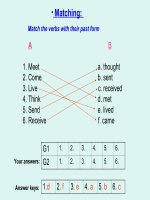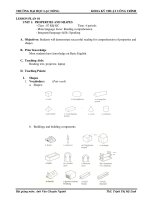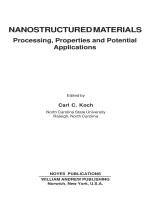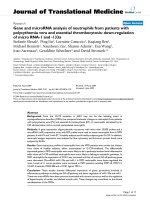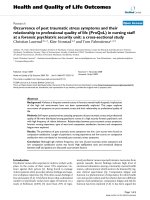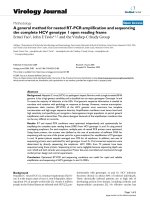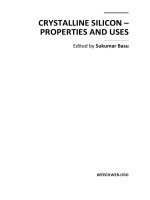UNIT 1: PROPERTIES AND SHAPES pot
Bạn đang xem bản rút gọn của tài liệu. Xem và tải ngay bản đầy đủ của tài liệu tại đây (485.78 KB, 6 trang )
TRƯỜNG ĐẠI HỌC LẠC HỒNG KHOA KỸ THUẬT CÔNG TRÌNH
Bài giảng môn: Anh Văn Chuyên Ngành ThS. Trịnh Thị Mỹ Linh
LESSON PLAN 01
UNIT 1: PROPERTIES AND SHAPES
- Class : 07 KQ-KC Time: 4 periods
- Main language focus: Reading comprehension
- Integrated language skills: Speaking
A. Objectives: Students will demonstrate successful reading for comprehension of properties and
shapes.
B. Prior Knowledge
Most students have knowledge on Basic English.
C. Teaching Aids:
Reading text, projector, laptop
D. Teaching Points:
I. Shapes
1. Vocabulary: (Pair work)
a. Shapes:
b. Buildings and building components
TRƯỜNG ĐẠI HỌC LẠC HỒNG KHOA KỸ THUẬT CÔNG TRÌNH
Bài giảng môn: Anh Văn Chuyên Ngành ThS. Trịnh Thị Mỹ Linh
2. Language focus:
a. To be shaped like sth.
Ex: The brick is shaped like a rectangular prism.
Exercise 1: Complete the sentences, using “be shaped like …” - (Group 1)
1. The hotel is shaped like a ……
2. The top of the minaret is shaped like a………
3. The dome of the Egyptian house is shaped like a …….
4. The column is shaped like a …….
5. The slab is shaped like a ……
6. The church is shaped like a …….
7. The power station building is shaped like a ……
b. To be + adj. + in shape
*Two – dimensional shapes:
Example:
Exercise 2: Make sentences from the table: - (Group 2)
c. S + be + noun-shaped
Example: The brick is rectangle – shaped.
TRƯỜNG ĐẠI HỌC LẠC HỒNG KHOA KỸ THUẬT CÔNG TRÌNH
Bài giảng môn: Anh Văn Chuyên Ngành ThS. Trịnh Thị Mỹ Linh
Exercise 3: Answer the questions (Group 3)
1. Which building is pencil-shaped? …………………
2. Which building component is I-shaped in cross-section?…………………
3. Which building component is C-shaped in cross-section? …………………
4. Which dome is egg-shaped? …………………
5. Which arch is horseshoe-shaped? …………………
6. Which building has diamond-shaped windows? …………………
II. Properties:
1. Vocabulary:
2. Language focus:
S + has/have the property of …
Ex: Aluminum has the property of non- corrosion resistance.
Aluminum is not corrosion resistant.
TRƯỜNG ĐẠI HỌC LẠC HỒNG KHOA KỸ THUẬT CÔNG TRÌNH
Bài giảng môn: Anh Văn Chuyên Ngành ThS. Trịnh Thị Mỹ Linh
Exercise1: Complete the sentences . Then, look at the picture and match with the sentence below:
(work individually)
1. The polythene membrane can prevent moisture from rising into the concrete floor. This means
that polythene is
2. The T-shaped aluminum section can resist chemical action, i.e. aluminum is
3. The stone block cannot be lifted without using a crane. This means that stone is
4. The corrugated iron roof cannot prevent the sun from heating up the house, i.e. iron is
5. Glass wool can help to keep a house warm in the winter and cool in the summer, i.e. glass
wool is
6. The ceramic tiles on the floor cannot be scratched easily by people walking on them. This
means that ceramic tiles are
7. Asbestos sheeting can be used to fireproof doors. In other words asbestos is
8. Black cloth blinds can be used to keep the light out of a room, i.e. cloth is
Exercise 2: Make sentences from the table: (Work in pairs)
TRƯỜNG ĐẠI HỌC LẠC HỒNG KHOA KỸ THUẬT CÔNG TRÌNH
Bài giảng môn: Anh Văn Chuyên Ngành ThS. Trịnh Thị Mỹ Linh
III. Reading: Building materials
Building materials are used in two basic ways. In the first way they are used to support the loads
on a building and in the second way they are used to divide the space in a building. Building
components are made from building materials and the form of a component is related to the way in
which it is used. We can see how this works by considering three different types of construction:
In one kind of construction, blocks of materials such as brick, stone, or concrete are but together to
form solid walls. These materials are heavy, however, they can support the structural loads
because they have the property of high compressive strength. Walls made up of blocks both
support the building and divide the space in the building.
In another type of construction, sheep materials are used to form walls which act as both space-
dividers and structural support. Timber, concrete and some plastics can be made into large rigid
sheets and fixed together to form a building. These building are lighter and faster to construct than
buildings made up of blocks.
Rod materials, on the other hand, can be used for structural sup-port but not for dividing spaces.
Timber, steel and concrete can be formed into rods and used as columns. Rod materials with high
tensile and compressive strength can be fixed together to form framed structures. The spaces
between the rods can be filled with light sheet materials which act as space dividers but do not
support structural loads.
TRƯỜNG ĐẠI HỌC LẠC HỒNG KHOA KỸ THUẬT CÔNG TRÌNH
Bài giảng môn: Anh Văn Chuyên Ngành ThS. Trịnh Thị Mỹ Linh
Exercise 1: Read the passage and complete the table. (work individually)
Function of components
Form of
material
Structural
support only
Space
dividing only
Both structural
support and
space dividing
Blocks
Sheets
Rods
Exercise 2: Read the passage again and mark True/ False. (Pair work)
1. Rod materials can be used for both dividing space and supporting the building……….
2. Concrete can be used as a block material, a sheet and a rod material………….
3. Steel is used for frame construction because it has high tensile strength and low compressive
strength…………
4. The sheet materials, which act as space dividers in frame construction building, can be very
light because they do not support structural loads…………
5. Mass construction buildings are light whereas planar construction buildings are
heavy………
IV. More reading: History of architecture
1. Vocabulary:
2. Reading:
